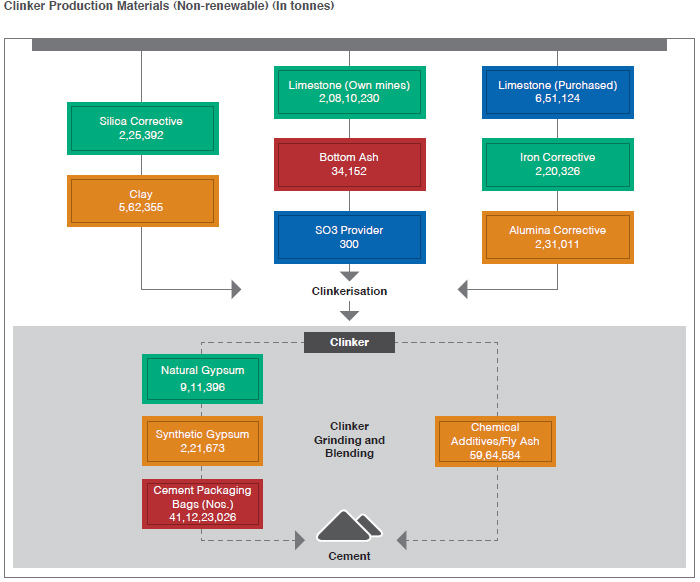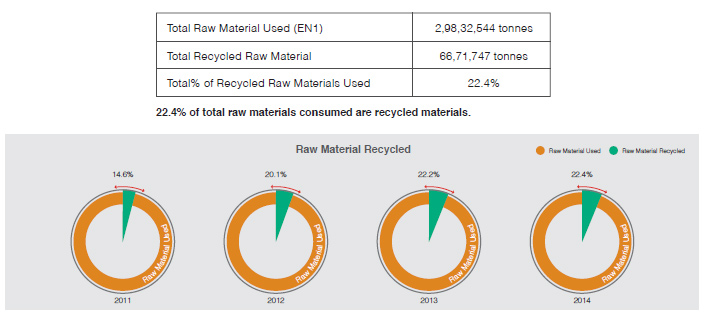Today, environmental & development issues are at
loggerheads in many parts of the world. We at Ambuja
Cement have adopted sustainability as our way of
doing business with due regard to the environment,
energy management, efficiency enhancement, safety
and community concerns. We invest in environment
protection measures with a view to leave no or low traces
of our operations. We have installed continuous emission
monitoring systems (CEMS) at all our nine kilns and
continuous ambient air quality monitoring systems
(CAAQMS) at all our plants for real-time monitoring of
all vital pollution parameters. The Company places
considerable stress on emission monitoring and
management.
The Company is assessing and initiating steps to meet the
newer and tighter environmental standards in India. ‘New
Emission Standards for Cement Industry’ was released by
the Government in August, 2014. This requires significantly
newer technologies and investments which are currently
under evaluation. We believe that our vision of sustainable
development and environment conservation can be
achieved more effectively through a structured and
systematic approach. Ambuja is empowered by its
overarching 'Corporate Environment Policy' along with
unit-specific policies. The corporate policy is in conformity
with the Ministry of Environment and Forests‘ guidelines.
In addition, we also have various specific policies like the
Corporate Sustainability Policy, Climate Change Mitigation
Policy, and Green Procurement Policy which mention the
Company’s approach towards sustainable development,
climate change mitigation, and greening of the supply
chain. All our manufacturing locations have an environment
team equipped with laboratory facilities to enable complete
monitoring of stack emissions, ambient air quality, noise
level, and water quality. These teams are also responsible increase AFR use; and reduce the use of limestone by
reducing the clinker factor with increased use of fly ash.
Cost of major raw materials, fly ash and gypsum,
increased by two per cent on a ‘per tonne’ basis. During |
for implementing various environment initiatives at the
units. A key element of our strategy towards environmental
management is the environmental assessment system.
We have implemented Holcim’s Plant Environmental Profile
(PEP) system for the annual monitoring of plant’s
environment performance. In addition, corporate
requirements including CO2 Emissions Reporting Protocol,
AFR Directive, Asbestos Directive, PCB Directive, Quarry
Rehabilitation Directive, Water Directive, Biodiversity
Directive, and Environment Monitoring and Reporting
(EMR) protocol, were also followed.
PEP System
The Plant Environment Profile (PEP) is the Company's
internal annual environment performance assessment
system. The assessment is based on a detailed &
standardised online questionnaire, which incorporates
key elements of ISO 14001 along with key performance
indicators covering a wide range of topics. These include
atmospheric emissions, energy and material consumption,
water, and waste and quarry management. At the end of
the assessment the environment performance index score
is calculated. The score is used to rate plants internally
and to benchmark them against the Group’s other
operating plants.
Management of Natural Resources
Cement production involves use of natural resources as
key raw materials. As a responsible Company, Ambuja
recognises the global pressures on natural resources.
Efforts are in place for better material management, like the
use of low grade limestone, synthetic gypsum waste from
other industries, as well as fuel. As part of our sustainability
initiative, we aim to increase biomass use to 10% by 2017; the year, the royalty on limestone was hiked by 27%.
Overall, the raw material cost per tonne increased by
approximately 13% over the previous year. |


























